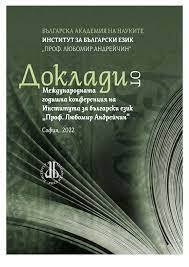
Вариантност, дублетност и синонимия в терминологията
The report attempts to explain the relationship between these concepts in terminology, to clarify their boundaries, as well as to answer the question of whether the phenomenon of variance in terminology is needed and how it will develop in the future. Today there is an unprecedented growth of specialized knowledge worldwide and the variability is directly related to the dynamic development of knowledge. This is because, in short, when a new concept emerges, variance clearly reveals the process of finding the most appropriate and adequate linguistic form of the term in accordance with the specifics of the scientific or professional field. Finding the most accurate linguistic expression of a scientific concept is a very important and very complex activity that requires both professional and linguistic training. And the fact that the same scientific concept can often be expressed through different formalgrammatical structures is a proof of the rich word-formation possibilities of the Bulgarian language.
More...